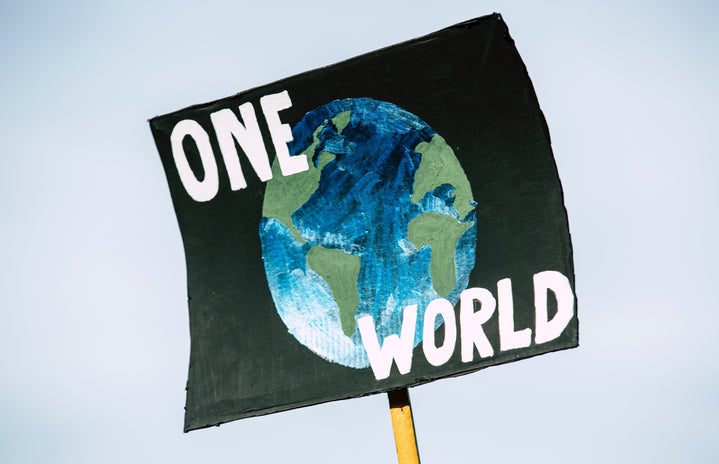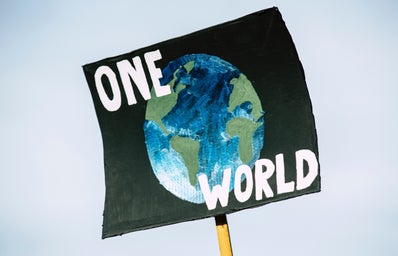April 22nd, Earth Day.
“People must understand that our credit cards are worth more than our voter titles.”
That was the sentence that started a conversation with Luiza Sarmento and Aurora Segall, the creators of the project Recicle Reutilize Plante, about how we can help planet Earth from home. What did they mean with that statement? Luiza explained that you can vote for a politician who does not fulfill their promises, and the power you give them was in vain, however, when you give your money to a company, you are giving them the power to take actions to try to get even more money from you, including to deal with politics. That is the power of your credit card, and money in general: the impact you – and others, depending on what you buy — have on the planet, it all depends on how you use it.

The world celebrates Earth Day every year, but in 2021 the context is different: COVID-19 forced societies to re-evaluate habits that often generate a lot of human impact on the planet. Now more than ever, we need to think about how we can help the planet sustain itself, and do what we can from our own homes, since our linear economy model will not be able to hold up for long.
“The natural system is circular and we turned it into a line, stretched it, and pretended that we do not know what happens at the tips, starting to look at it as only the consumption box“, explains Luiza. As we know, natural resources are finite. You cannot just extract it and not give it back. Sustainable habits, therefore, are a way to mitigate, or at least delay this degradation.
Hence, Earth Day is not a day to celebrate. It was created to promote consciousness about the problems we are causing in the world. For this reason, we made a list, with the help of experienced people in sustainable practices, like Luiza and Aurora, of things you can do to help our planet from home. Check it out!
- Understand your role as a protagonist in consumer society
-
“Everybody’s a consumer. If everyone is a consumer, everyone produces garbage. If everyone produces garbage, everyone is responsible for it“, recalls Luiza. It is also important to reinvent yourself and resignify the word “garbage” from your vocabulary. Understand that nothing is “thrown away”: things are just rearranged, they do not disappear after your trash is collected. It takes years, decades, centuries for certain types of material to decompose!
- Reevaluate your habits
-
The creator of @planetapospandemia, Gabriel Ferri, advises to start with what you find easier to fit into your routine: you can start by properly separating waste, by turning off the light in rooms that aren’t being used, by closing the tap while brushing your teeth, while soaping the dishes, by collecting rainwater to wash the yard and sidewalk, and so on. Gabriel’s motto is that everyone should carry what they can: “Act locally, think globally. And surely your attitude will make a difference.“
- Avoid disposable plastics
-
It is important to reduce the consumption of plastic from our routines as much as possible since its recycling potential is not used properly in Brazil (approximately 21%!). The plastic ends up not having a happy ending since it does not biodegrade and, when it fragments, it contaminates everything with its bisphenol.
To get rid of most packages, start buying in bulk. Exchange plastic bags for EcoBags and go to free, organic fairs, emporiums, natural, and bulk stores. You stop producing food packaging waste by carrying your own glass containers or cloth wreaths. You still choose the exact amount you need while generating less waste, saving money, and, of course, eating much better.
Another easy option is to substitute the plastic bags used in trash cans for paper ones! Take a look at the video below and learn how to do it: simple and fun!
- Question yourself in the act of buying
-
You are sitting in front of your computer. The cart from the online store is full. The items inside of it are gorgeous. However, before you click on the bottom saying “finish shopping”, there are some questions you need to ask yourself.
“How long will it last?“, “Will I use it enough for it to value its cost and impact after I throw it away?“, “Am I buying it on impulse?“
These are some of the questions Luiza proposes for us to always ask ourselves before buying something. But do not click the bottom yet! If all those questions were answered and you decided to buy the products, it is now time to consider the biggest factor: if the items can be replaced for more ecological options. For instance, according to environmental activist Laila Zaid, the simplest replacements we can choose are bamboo toothbrushes in place of plastic ones, reusable cups, and bottles instead of disposables, natural cosmetics in biodegradable packaging, and cleaning products without chemicals that are harmful to the environment.
Here are some examples of stores where you can find ecological options for products you may already use: @carinho.absorventes, @use.bob, @relaxcosmeticos, @_korui_.
- Consider what else you can do with something before getting rid of it
-
The first thing that comes to our minds when we finish the use of something is: discard. But there are a lot of other things that the “trash” can turn into.
For example, Aurora explains “when I am buying food, I choose the ones that have the most pretty glass packaging, so that I can use it afterward to store my kitchen things”. That is another awesome idea! This way she can help the planet and get a new beautiful decorative item!
Another thing that we can do from home is related to plastic waste! In addition to recycling, we can reuse it, making new pots for plants for example. It’s so good to have flowers in your home, and, right now, it is a good way to pass the time. You’ll find a tutorial below If you want to try this out.
To find out other things you can do, check: @reciclereutilizeplante
- Clean the recycling waste
-
You bought your wonderful products. Used them for as long as you could and have already considered reusing them for other purposes, different from the original ones they have. Then, you decided to give them to a recycling cooperative. Good job! Just remember: all recyclables must be sanitized. Aurora, from Recicle Reutilize Plante, told us an episode that shows what has to be sanitized: “Once, some friends came to visit, we ate a pizza, and then, at the end of the night, I was washing the pizza box. And then they asked, ‘But why?’ and I said, ‘Guys, it’s cardboard! Cardboard recycles 100%!‘. When the residue is clean, even if there is no selective collection, it can have longer survival.
- Observe the material at the time of disposal
-
There are some objects with many parts made of different materials. This makes it more difficult for them to be recycled. However, you can try to help it, even a little bit. Observe: can you take apart something, separating the different materials? If you can separate the parts, it makes it a lot easier. You may not be able to recycle the body, but even if you save small parts to be recycled, it already makes a difference.
You may say to yourself “But this is too small! I do not think they will use this when I throw it away!” However, the small things, if gathered repeatedly, can have better chances of being recycled. Therefore, try to gather small things of the same material and toss them together!
- Reduce the volume of leftover food that is routed to landfills and dumps every day by composting it
-
Waste production is a global problem and, with the gradual increase in the population, it is necessary to find increasingly capillary solutions to this problem. Composting organic materials is an amazing option to reduce the amount of waste we produce. It generates, at the end of its process, humus, a stable material, rich in nutrients and minerals, that can be used in vegetable gardens and for other agricultural purposes, such as organic fertilizer. Because it is a natural decomposition process, it is non-toxic and acts as a sustainable alternative to the use of synthetic fertilizers.
From the composting, you can start to cultivate a vegetable garden, since it is possible to start one, due to its small size, in any space, we have available in our houses. This is beneficial for both the environment and you because you will spend less in the supermarket and consume healthier foods!
- If possible, go vegan/vegetarian/plant-based
-
For the sake of the environment, everyone should reduce meat consumption. But if you can’t get the meat out of your food, at least try not to consume it once a week, as the “Meat Free/Meatless Monday” movement proposes. Agriculture is responsible for 80% of deforestation in the Amazon rainforest and for the same volume of greenhouse gases that cars, trucks, airplanes, and ships emit together on the planet. Moreover, it is the industry that consumes the largest volume of water in the world, not returning it to the environment, besides contaminating soils, rivers, and lakes with the residues of its activity. Therefore, there is an urgent need to reduce meat consumption.
- Speak to your friends, neighbors: spread information!
-
Communication is of huge importance! At first, it may seem that talking to an individual is a small thing and that it will not have a real impact on the world. However, the collective is made out of individuals: if someone incorporates sustainable practices in their house, this person is probably going to try to take those to their working place.
Also, schools must understand the impact of teaching children from a young age: the sooner they learn the impact that small actions such as turning off the lights after you leave a room have, the better. Information needs to be constantly disclosed.
The start is only given when we understand the real gravity of the destruction we are causing to the planet. Therefore, the dissemination of information that shows the causes and effects, with shocking but effective data for persuasion, is important for the amplification of the cause.
“We need to use all of our communication channels. Let’s talk about it! Let’s tag friends on social networks, share, reverberate!” said Laila. Luiza, in accordance, brings up a great idea for the media to influence ecological practices: in Brazil, soap operas dictate many societal behaviors; as a consequence, if these actions are incorporated naturally on the characters’ scenes, for instance, showing a girl cleaning her trash before tossing it, people are more likely to repeat them.
On Earth Day, “if there is anything to be celebrated, I think it is raising awareness. Global warming, the summer heat, the rains, the hurricanes, everything that is happening on the planet makes people realize the relation between one thing and the other. The pandemic itself is the result of an environmental imbalance,” Aurora recalls. Still according to her, if the individual takes this awareness to every place they go in life, then they amplify this ability to impact. “Consciousness never shrinks. Like the universe, consciousness can only expand,” and Gabriel concludes: “It’s only up to you and your power to change, nothing is difficult when there’s a will.“
If you want to learn more about this cause and how you can help the planet from home on this Earth Day, and every other day, check out some spectacular accounts!
- @autossustentavel
- @ecoaliza
- @portalecycle
- @essenossomundo
- @menos1lixo
- @meio.sustentavel
- @naoselixe
- @portal.sustentabilidade
- @agorasoueco
—————————————————————–
The article above was edited by Laura Okida.
Liked this type of content? Check Her Campus Casper Libero’s home page for more!




